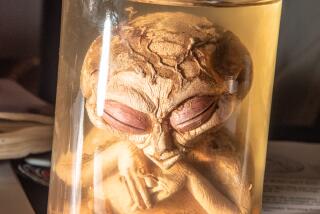Robert Funk, 79; Scholar Questioned Miracles of Jesus
- Share via
Robert W. Funk, founder of the controversial Jesus Seminar, which called into question New Testament miracle stories and the authenticity of many of the statements attributed to Jesus, has died. He was 79.
Associates at the Westar Institute, which sponsored the Jesus Seminar, said Tuesday that Funk died Saturday at his Santa Rosa, Calif., home of lung failure. He had undergone surgery in July to remove a malignant brain tumor.
After many years in academia, Funk’s rise to public recognition came after he founded the nonprofit Westar Institute in Santa Rosa in 1985 to promote research and education on what he called biblical literacy. Its first project, the Jesus Seminar, renewed the quest for the historical Jesus.
In the course of those studies, the think tank stirred controversy among conservative Christians even as liberal Christians applauded its scholarship for making Christianity believable and relevant in the postmodern world.
Among the Jesus Seminar’s assertions was that many of the miracles attributed to Jesus never occurred, at least in a literal sense. Nor, the Jesus Seminar concluded in 1995, did Jesus rise bodily from the dead. The scholars also agreed that there probably was no tomb and that Jesus’ body probably was disposed of by his executioners, not his followers.
But scholars -- who included Burton Mack, Marcus Borg and John Dominic Crossan -- also concluded that the religious significance of Jesus’ resurrection did not depend on historical fact.
“We wanted to make an affirmative statement to all those who think we only care about tearing down Christian faith,” Funk said at the time.
The seminar, which eventually attracted more than 200 fellows in religion and meets twice a year, became famous for how its scholars voted on the authenticity of the biblical accounts, using different colored beads for grading: red for undoubtedly accurate, pink for probable, gray for passages containing some historical truth and black for passages they found without historical basis. In all, 80% of the passages attributed to Jesus were rejected by the seminar.
Among the Jesus Seminar critics was religious broadcaster Pat Robertson. In 1991, when someone joked, “I’d like to make them swallow their beads,” Robertson laughed and called the project an attempt to “accommodate the Bible to their own disbelief.”
Jesus Seminar votes on biblical issues followed debate and dialogue among the scholars, as well as the preparation of scholarly papers. The seminar also published its own translations of Christian Scriptures, color-coding the text in the way the scholars voted.
By the time Funk launched the Jesus Seminar, the search for the historical Jesus had been underway at least 150 years among historians and scholars. The seminar made public what previously had been confined to seminaries and universities.
“The single most important thing for those of us who had anything to do with [Funk] was his insistence that we do what we do in public,” Jesus Seminar fellow Daryl Schmidt, a professor of Greek and the New Testament at Texas Christian University, said Tuesday. “We didn’t make any of this up. Anyone who’s been to seminary knows this, but this” was “the best-kept secret.”
But the peeling away of layers of what the seminar considered to be myth and storytelling about Jesus outraged conservative Christians. Ten years ago, two professors at Biola University, a conservative Christian institution, wrote a book assailing the Jesus Seminar, titled “Jesus Under Fire.”
“They leave people spiritually bankrupt and hopeless,” the two authors, Michael J. Wilkins and J.P. Moreland, wrote of the seminar. Others called the Jesus Seminar’s scholarship shallow.
Luke Timothy Johnson, a Catholic scholar, contended that the seminar’s “obsessive concern with historicity and its extreme liberalism merely represents the opposite side of fundamentalism.”
But Funk was unbending. Jesus, Funk said, was “one of the great sages of history,” but he was not the man portrayed in a surface reading of the New Testament.
“I do not want my faith to be in Jesus, but faith in the really real ... in some version of whatever it was that Jesus believed,” Funk said.
Born on July 18, 1926, in Evansville, Ind., Funk earned his bachelor’s of divinity and master’s degrees from Butler University and its affiliated Christian Theological Seminary in 1950 and 1951. He earned a PhD in 1953 from Vanderbilt University and was a Guggenheim Fellow and a Senior Fulbright Scholar.
He also taught at the American School of Oriental Research in Jerusalem, was chairman of the graduate department of religion at Vanderbilt University and executive secretary of the Society of Biblical Literature.
His books include “Language, Hermeneutic, and Word of God” (1966), “The Five Gospels: The Search for the Authentic Words of Jesus” (1993), “Honest to Jesus: Jesus for a New Millennium” (1996) and “The Acts of Jesus: The Search for the Authentic Deeds” (1998). He also wrote “A Credible Jesus,” which was published in 2002.
He is survived by his wife, Charlene Matejovsky of Santa Rosa; daughters Andrea Ray of Eugene, Ore., and Stephanie McFarland of Portland, Ore.; and a brother, Charles Anthony Foster, of Tampa, Fla. Funeral services will be private. A memorial service is planned later this month at the Westar Institute.
More to Read
Sign up for Essential California
The most important California stories and recommendations in your inbox every morning.
You may occasionally receive promotional content from the Los Angeles Times.













